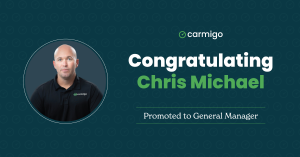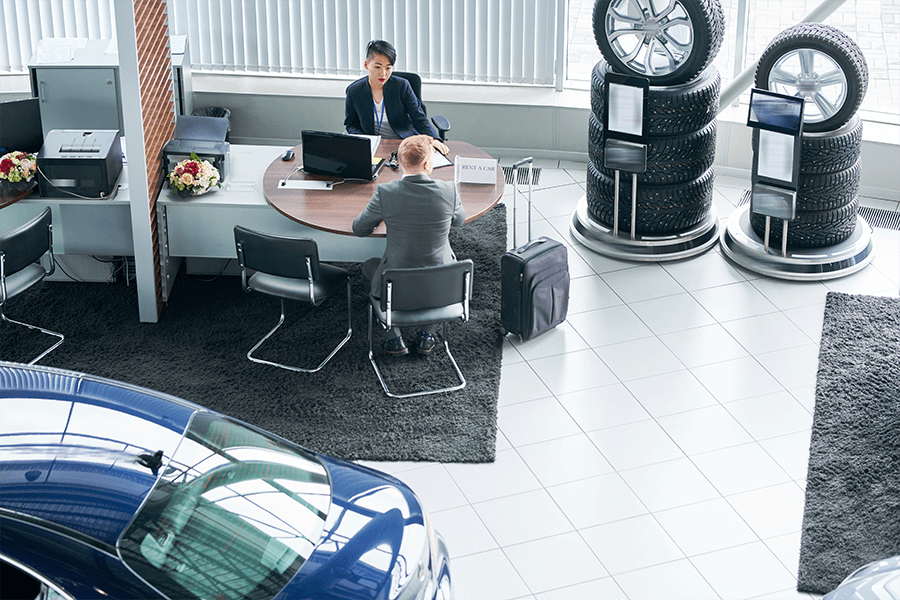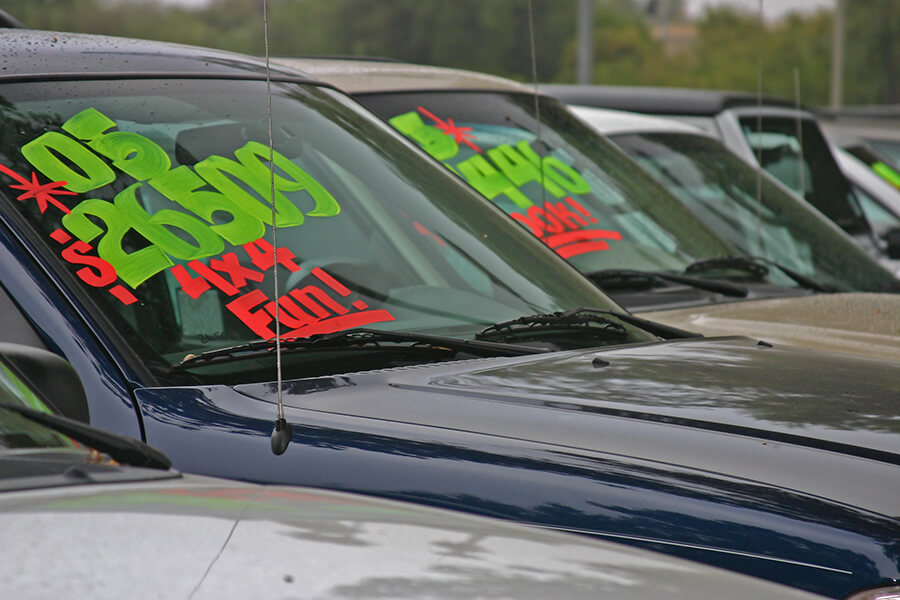
Carmigo’s Inside Sales Representative Dylan Richey has been in and around dealerships his whole career, so he’s seen the process from just about every angle process.
We sat down with him this week to talk about how to buy a car as we head into this holiday season.

JB: What are the questions you need to be thinking about when shopping for a new car?
Dylan: Well, really, you need to know what your need is for the car.
Then, I would say your budget would be the most important thing. Depending on your budget that’s also going to determine if you would want to buy a new or used car.
JB: And then how important is the dealership? Like, can you go to anyone? Are they about the same?
Dylan: So you want to find a dealer that’s got a good reputation. And you can do that by looking at Facebook and Google reviews. Or just word of mouth — asking around to friends and stuff. But you want to go to one that you can trust. You don’t want to go to a dealership you’re unsure about.
JB: Yeah, I mean it’s usually a five-figure decision, right?
Dylan: Well, for sure.

JB: What about the individual salesperson when you get there? Do they have control over the sale or are they sort of a go-between?
Dylan: So the salesperson, they’re kind of the go-between with you and the sales managers. Which, obviously the sales managers are the ones that are setting prices. But your salesperson is going to be an important part of the process. So you want someone you trust will take care of you.
Someone that you know isn’t going to pressure you to make a knee-jerk decision to buy a vehicle you don’t want or can’t afford.
Dylan: You may just mention something to the salesperson because sometimes the salesperson can kind of break the ice between you and the managers. But if it’s still not the right fit — if you have a feeling that it’s not right — I would suggest that you maybe look for a different dealership or do some more research to see if you know anyone that’s bought from that dealership and see how they felt about it.
Dylan: Yes. Most salespeople know everybody at the other local dealerships. So there’s something that they may not have you can get at another lot.
They may say, “Hey go see so-and-so across the street, they’ll take care of you.” Obviously, they want to make the sale. But if they can’t make the sale they can refer you to someone that they know who will take care of you and help you find what you want.

Dylan: So the MSRP is the manufacturer-suggested retail price. So Toyota may recommend that the price should be twenty thousand dollars. Right now it’s kind of important. Because of the car market, most dealers are adding an addendum to that. So they’re not going off the MSRP. They’re adding an additional cost. It’s very important to look at that. To make sure you’re getting a good deal.
JB: I know this summer part of the reason that cars were above MSRP wasn’t necessarily because the dealership was trying to make more money but it was because it was costing $5,000 more to get the car to the lot. So is it important to not just know the number, but to know why the price you’re being offered is what it is?
Dylan: Yeah for sure it’s important to know that. When it was hard to get inventory or it costs more to transport the vehicle, whatever the reason was, they were marking it up to adjust to the market price at that time.
But take for instance trucks: The dealers might put some different wheels, tires, and lift kits on there. So having an addendum for that may not necessarily be a market adjustment. It may just be for those accessories they put on the vehicle.
JB: And so if you’re in a market where people aren’t buying as many cars, you might get a car under MSRP, Yeah.
Dylan: They don’t have to make as much if they’re selling 40 versus 10.
JB: A lot of folks are worried the dealers are making all kinds of money with a big markup. But to me, it kind of seems like there’s not a ton of margin.
Dylan: Most reputable dealers are not there to make a ton of money off of you. Obviously, they’re gonna want to make a little bit of money, but the average is gonna be around $1,500 to $2,000. They’re not there to make 10-15 thousand dollars like people think. But they still have to pay for the vehicle.
Dylan: And the way that the market is right now, they’re having to overpay for the vehicles on their lots.
JB: So a lot of people are kind of nervous about going to the dealership. What are the benefits and risks of just buying a car privately?
Dylan: A private party sale has some benefits. The main benefit is that you could possibly get the vehicle a little cheaper just because a private party is not gonna have the overhead that a dealership has.
But you take a lot of risk with a private party. They may not be truthful about the condition of the vehicle mechanically or cosmetically. You may not be able to ask for a carfax history report — see if they take the vehicle has been in a wreck. How can you verify that? If you ask for a dealership, a dealership can provide that for you.
And then you’re taking the risk of just simply meeting a stranger. That can be unsafe.
Plus then there’s the aspect of titles. If you don’t buy and sell cars every day, you may not know how to handle titles and loan paperwork and all that. When you go to a dealership, they’re taking care of all the paperwork for you versus a private party where you’re gonna have to call around and jump through hoops to try to get that title corrected or to even hope that you get the title.
JB: I think one thing that kind of worries me about private is that these are people who probably wanted more money than what a dealer was willing to pay for it. And also maybe the dealership didn’t want it because it has issues.
Dylan: People can go to the local parts stores and get them to turn a check engine light off. So, you don’t know.
But a dealership, once they get the car in, they run them through the service department, and they fix the issues that are wrong with the vehicle before they put it out on the lot to resell it.
JB: All right, so you’re buying a car. Walk us through — beginning to end. What do you do?
Dylan:
JB: What about if I’m trying to decide between an Accord and a Camry?
Dylan: If you want a new vehicle, you would have to go to a Toyota or Honda dealership, but if you’re looking at the used market, you can go to the used dealership. And most used dealerships are going to have tons of different makes and models that you can test drive.
But a good suggestion, if you’re not sure, is to go to the used dealership test drive, a few — Toyota, Honda, Nissan, Lexus, whatever — and then decide. If you want to go with something newer, then you can go back to that new dealership. That way, you don’t have to travel so much and go in between so many dealerships.
JB: And I guess the dealerships that have more makes and models probably have some opinions based on what they sell and what they see come back to the service department.
Dylan: Right, most of them know of any common issues. So that’s good to ask about as well. You can learn a lot by doing that.
JB: All right. Well, thanks for sharing some expertise with us, man.
Dylan: Yeah, anytime
When you’re trying to figure out how to buy a car, you’re usually trying to figure out how to sell a car too. The hardest part about buying a new car is selling your old one.
Yes. You can absolutely sell your car to a dealership. In fact, it’s one of the easiest ways to sell your car. But (and this is a big but), dealership trade-ins often fetch the lowest price.
You can do it from anywhere, and when it sells, we’ll handle the paperwork. Plus, we’ll pick it up. All for a flat rate of $350, which comes out of the final sale price.